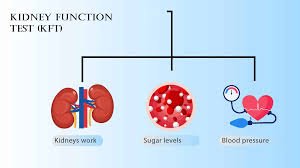The Kidney Function Test (KFT), also widely known as the Renal Function Test, is a panel of blood and/or urine tests designed to evaluate how well your kidneys are working. These bean-shaped organs, located below your rib cage on either side of your spine, play a vital role in filtering waste products and excess fluid from your blood, which are then excreted as urine.
They also help regulate blood pressure, produce red blood cells, and maintain the balance of essential electrolytes.
Given the kidneys’ critical role in overall health, regular monitoring of their function is essential, especially in modern lifestyles where factors like diet, stress, and pre-existing conditions can impact their well-being.
What is KFT and Why is it Important?
The kft test is a crucial diagnostic tool used to:
- Assess Kidney Health: It provides a comprehensive picture of your kidney’s filtering capabilities.
- Diagnose Kidney Disease: Elevated levels of waste products or imbalances in electrolytes can indicate kidney damage or disease.
- Monitor Existing Kidney Conditions: For individuals already diagnosed with acute kidney injury or chronic kidney disease (CKD), regular KFTs help track disease progression and evaluate the effectiveness of ongoing treatment.
- Evaluate Risk Factors: It helps identify kidney issues in individuals with underlying conditions that increase kidney disease risk, such as diabetes, high blood pressure, and heart disease.
- Check Medication Effects: Certain medications can impact kidney function. The KFT helps monitor for any adverse effects and ensures appropriate drug dosages.
- Assess Overall Health: As part of a routine health check-up, KFT provides valuable insights into your body’s metabolic balance and fluid regulation.
What Does a KFT Panel Typically Include?
A standard Kidney Function Test panel usually comprises several key measurements:
- Serum Creatinine:
- What it is: Creatinine is a waste product from normal muscle wear and tear. Healthy kidneys filter it efficiently from the blood.
- Significance: Elevated creatinine levels in the blood suggest that the kidneys are not filtering waste effectively.
- Blood Urea Nitrogen (BUN):
- What it is: Urea Nitrogen is another waste product, formed when protein breaks down in the liver. Like creatinine, it is filtered by the kidneys.
- Significance: High BUN levels can indicate impaired kidney function, though they can also be affected by dehydration, high protein intake, or certain other conditions.
- Estimated Glomerular Filtration Rate (eGFR):
- What it is: eGFR is a calculated value (derived from your serum creatinine level, age, sex, and sometimes race/ethnicity) that estimates how much blood your kidneys’ tiny filters (glomeruli) clean each minute.
- Significance: It’s considered the best overall measure of kidney function. A lower eGFR indicates reduced kidney function.
- Electrolytes (Sodium, Potassium, Chloride, Bicarbonate):
- What they are: These are essential minerals that help maintain fluid balance, nerve function, and muscle function in the body. Kidneys play a crucial role in regulating their levels.
- Significance: Imbalances in these electrolytes can occur when kidney function is impaired, affecting various bodily processes.
- Uric Acid:
- What it is: Uric acid is a waste product from the breakdown of purines, found in certain foods and naturally in the body.
- Significance: High uric acid levels can be associated with kidney stones, gout, and can also indicate impaired kidney function.
In some cases, your doctor may also recommend a Urine Analysis (to check for protein, blood, or signs of infection in urine) or a 24-hour urine collection (to measure creatinine clearance or protein levels more precisely).
Who Should Get a KFT Test?
Your healthcare provider may recommend a KFT if:
- You have symptoms of kidney problems: Such as swelling in hands, feet, or ankles; fatigue; changes in urination patterns; muscle cramps; or nausea.
- You have risk factors for kidney disease:
- Diabetes
- High blood pressure (hypertension)
- Heart disease
- A family history of kidney disease
- Obesity
- Being over a certain age
- Taking medications that can affect kidney function
- You are undergoing a routine health check-up.
- You are being evaluated before certain medical procedures (e.g., those involving contrast dyes) or starting new medications.
- You are monitoring the progression of known kidney disease.
What to Expect During a KFT Test?
The KFT usually involves a simple blood test:
- Procedure: A small blood sample is drawn, typically from a vein in your arm, by a healthcare professional.
- Preparation: Generally, no special preparation or fasting is strictly required for a KFT. However, it is crucial to inform your doctor about all medications and supplements you are currently taking, as some can temporarily influence test results.
Your doctor might advise specific preparation if additional tests (like a lipid profile or blood sugar) are being conducted simultaneously. Avoiding strenuous exercise before the test may also be recommended as it can temporarily affect creatinine levels.
- Discomfort and Recovery: You might feel a brief pinch or sting during the blood draw, but discomfort is usually minimal. After the blood draw, you can typically resume your normal activities immediately.
- Results: Test reports are usually available within 24 to 48 hours, depending on the diagnostic facility.
Understanding Your KFT Results
Your doctor will interpret your KFT results based on standard reference ranges, considering your individual factors like age, sex, and medical history.
- Normal Ranges (approximate):
- Serum Creatinine: 0.6 to 1.2 mg/dL for men; 0.5 to 1.1 mg/dL for women (ranges can vary slightly by lab).
- BUN: 7 to 20 mg/dL
- eGFR: Above 90 mL/min/1.73 m² is generally considered normal.
- Electrolytes: Within specific ranges (e.g., Sodium 135-145 mEq/L, Potassium 3.5-5.0 mEq/L).
- Uric Acid: 3.4-7.0 mg/dL for men; 2.4-6.0 mg/dL for women.
Elevated levels of creatinine, BUN, or uric acid, or significant imbalances in electrolytes, particularly when combined with a low eGFR, can indicate impaired kidney function. Your doctor will explain what your specific results mean for your health.
Conclusion
The Kidney Function Test (KFT) is an essential diagnostic tool for assessing the health and efficiency of your kidneys. Given the silent progression of many kidney diseases, proactive screening through a KFT is crucial for maintaining your long-term health and quality of life.
By providing a clear snapshot of your kidney’s performance, the KFT empowers you and your healthcare provider to take timely action, manage existing conditions effectively, and work towards maintaining optimal kidney health and overall well-being.





